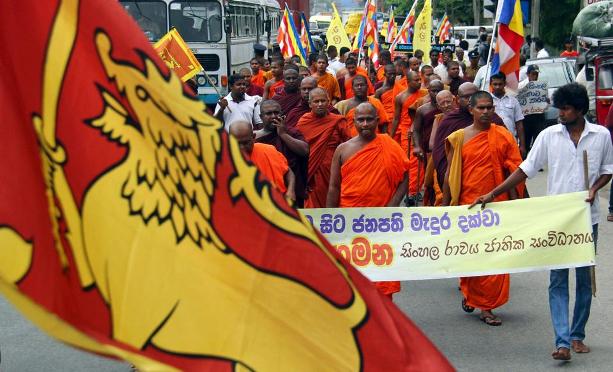Why is Sri Lanka planning to ban cattle slaughter?
Prime Minister Mahinda Rajapaksa submitted a proposal that legislates against the slaughter of cattle across the island nation – a decision that could inflame ethno religious tensions
COLOMBO – Sri Lankan Prime Minister Mahinda Rajapaksa has proposed a complete ban on the slaughter of cattle in the country after parliamentary deliberation on Tuesday (8).
Rajapaksa made the proposition while addressing the party’s parliamentary group meeting, stating that cattle slaughter should be prevented since many opposed the practice. He received unanimous approval from the group.
Cabinet spokesperson and Media Minister Keheliya Rambukwella was quoted in local media saying that Rajapaksa said he “hopes to ban cattle slaughter” and that he would decide when to submit the proposal to the government.
The government announced on Thursday (10) that the final decision pertaining to the ban will be delayed by a month.
If passed, beef imports will be allowed to cater to demand.
There is no official data demonstrating that the majority of Sri Lankans are in favour of a ban.
Majoritarian appeasement?
According to some observers, the timing of the proposal could be driven by political motivations.
“Buddhist monks have indicated they are strongly in favour of the move as eating beef is discouraged within the Sinhala Buddhist community for cultural reasons,” Roel Raymond, Editor in Chief at Roar Media, told TRT World.
Rajapaksa’s ruling Sri Lanka Podujana Peramuna (SLPP), which won a two-thirds majority in the parliamentary elections last month, largely draws its support from the country’s Sinhala Buddhist majority.
Could it be a tactic to offset some of the controversies the government finds itself embroiled in?
At the forefront is the 20th Constitutional Amendment bill, which would weaken curbs on presidential powers. The government has kick-started the legislative process following the amendment draft’s publication last week.
Raymond highlighted that talk of a ban also coincided with the swearing-in of Premalal Jayasekara, an MP of the SLPP who was convicted in August of murdering an opposition activist at a 2015 election rally.
“The public outrage sparked by Jayasekara’s swearing-in was diffused to some degree by the proposal to ban cattle slaughter. So there’s a degree of political calculation evident here,” she said.
Paikiasothy Saravanamuttu, Executive Director of the Colombo-based Centre for Policy Alternatives, considers the ban as “part of the appeasement of the Sinhala Buddhist majority” that will come “at the expense of the Muslim community.”
“It is another blow at the pluralism of the population,” he told TRT World.
The impact of a ban might be felt disproportionately by marginalized sections of society.
Raymond noted that it would affect domestic milk farmers who often sell male animals for meat.
“However, rural Sri Lankans are moving away from domestic production of milk and it is mostly run by large farms owned by the government and the private sector.”
“But this will affect a section of the Muslim community who are dependent on the meat industry.”
There is also speculation that the importation of meat will result in a spike in beef prices at local markets, she added.
Bovine politics
This is not the first attempt to have the practice of cattle slaughter banned.
Despite entertaining the idea over the years, no government has seen it fit to legislate on it – most likely due to it being bound up with socio-political and religious tensions.
Chief among them is Buddhist-Muslim relations, and the issue of cattle slaughter tends to surface during times when relations between the two communities are strained.
Buddhists make up 70% of Sri Lanka’s population and despite restrictions on the killing of animals, eating meat is common among a large portion. Beef on the other hand is considered off limits for Buddhists and Hindus.
But some believe that the subject of animal slaughter is less to do with Buddhism than with discrimination.
Cattle slaughter has frequently been raised by Sinhala nationalists and monks to alienate the Buddhist majority from and agitate against the Muslim minority.
Muslims, who constitute 9.7% of the population, have repeatedly endured harassment and attacks at the hands of hardline Buddhist groups such as the Bodu Bala Sena (BBS), a monk-led Sinhala nationalist organization that campaigned against halal food.
In 2009, Parliament considered a bill calling for a total ban on cattle slaughter presented by MP Wijeyadasa Rajapakshe, who said that while a ban would affect 300 to 400 people engaged in the meat business it would create thousands of new job opportunities in the dairy industry.
Rajapakshe claimed cattle slaughter in the country was a source of “bribery, corruption and counterfeit licences.”
In 2013, a campaign opposing halal certification was launched that forced stores to stop selling meat labelled with Islamic food guidelines. In the same year, a Buddhist monk self-immolated in protest over the killing of cattle by Muslims.
In 2018, the radical Hindu outfit Siva Senai staged a protest in the northern city of Jaffna calling for a beef ban, stating that Sri Lanka “is the land of Hindus and Buddhists.”
In a study that examined the impact of anti-halal and anti-slaughtering campaigns in the context of post-war Sri Lanka, authors Mohammad Yusoff and Athambawa Sarjoon concluded that Buddhist nationalist forces and their “intensified anti-minority hatred” have made it “challenging for ethno-religious minorities in Sri Lanka to engage in religious norms and duties.”
The Animal Act of Sri Lanka prohibits the slaughter of cows and calves below the age of 12, allowing local governments to regulate the slaughter under exceptional conditions. The law was originally passed in 1958 and amended in 1964.
Buddhism enjoys preeminence in Sri Lanka’s constitution, which states that “it shall be the duty of the State to protect and foster the Buddha Sasana” while ensuring freedom of religion as a fundamental right.
-TRT World


